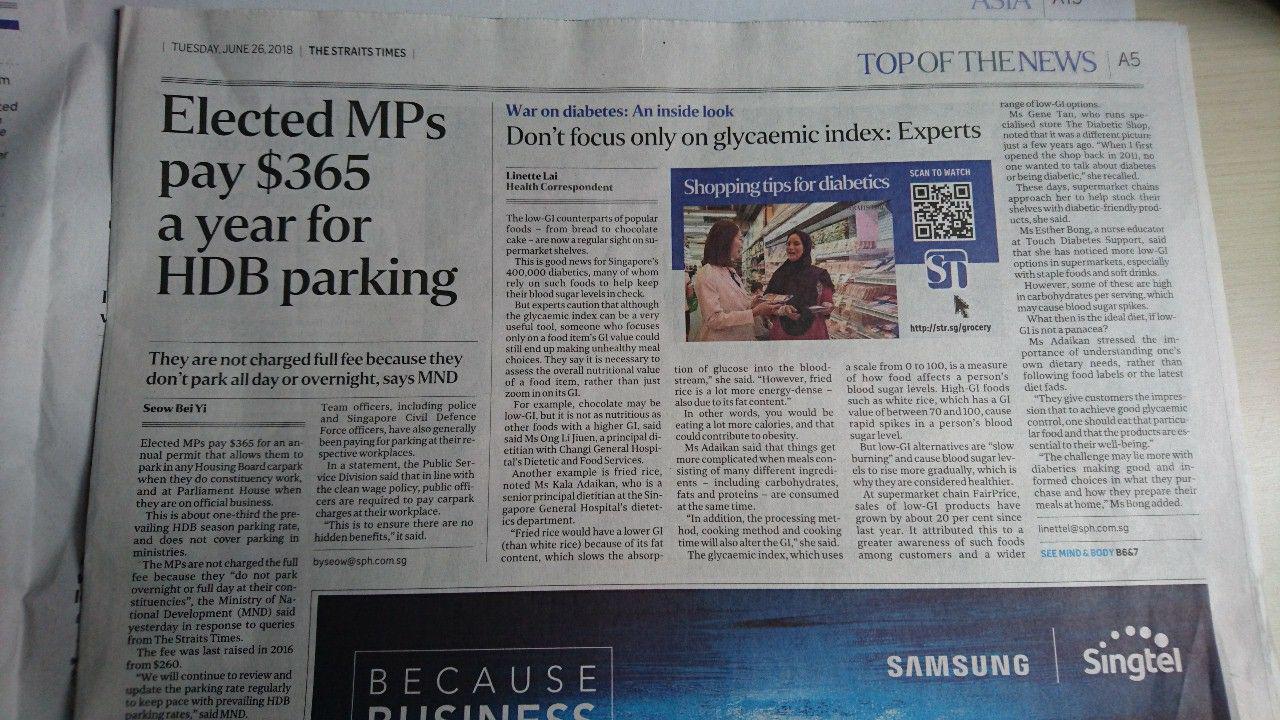Now, say what you will about our mainstream English-language daily broadsheet, but The Straits Times has done something that made Singaporeans sit up and take notice.
What are we talking about?
This, of course:
This stunning revelation was first reported early on Monday evening (6:30pm to be precise), with this story from ST:
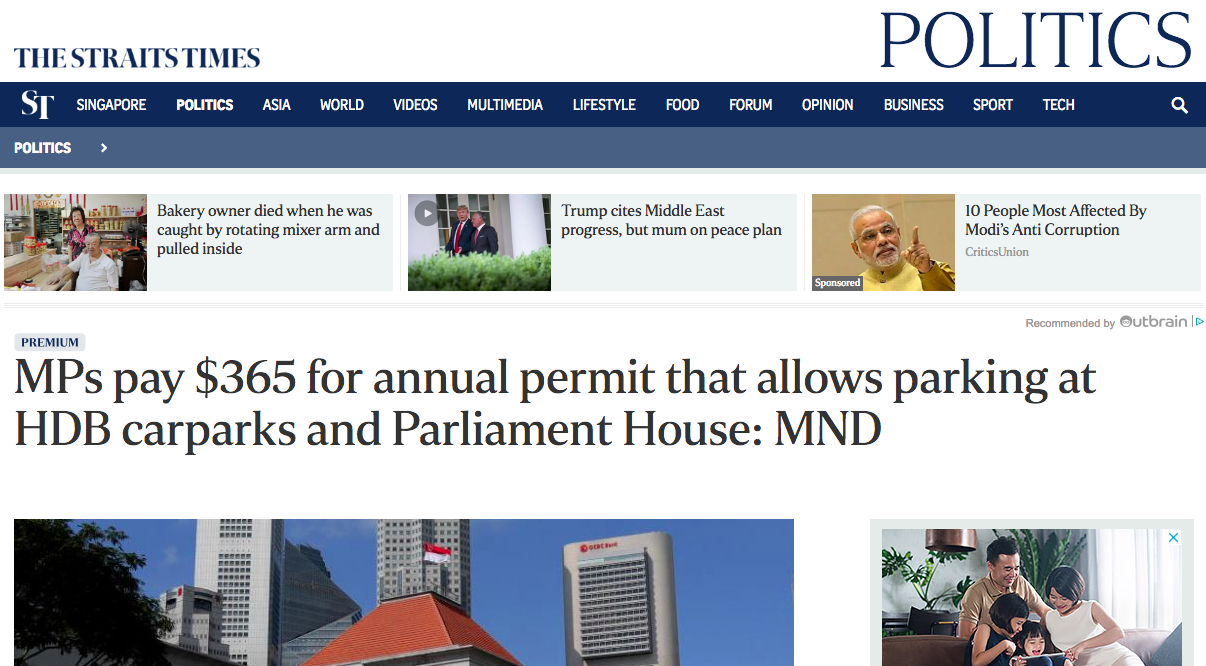 Screenshot via ST article
Screenshot via ST article
[related_story]
Indeed and justifiably so, there has since been fury online:
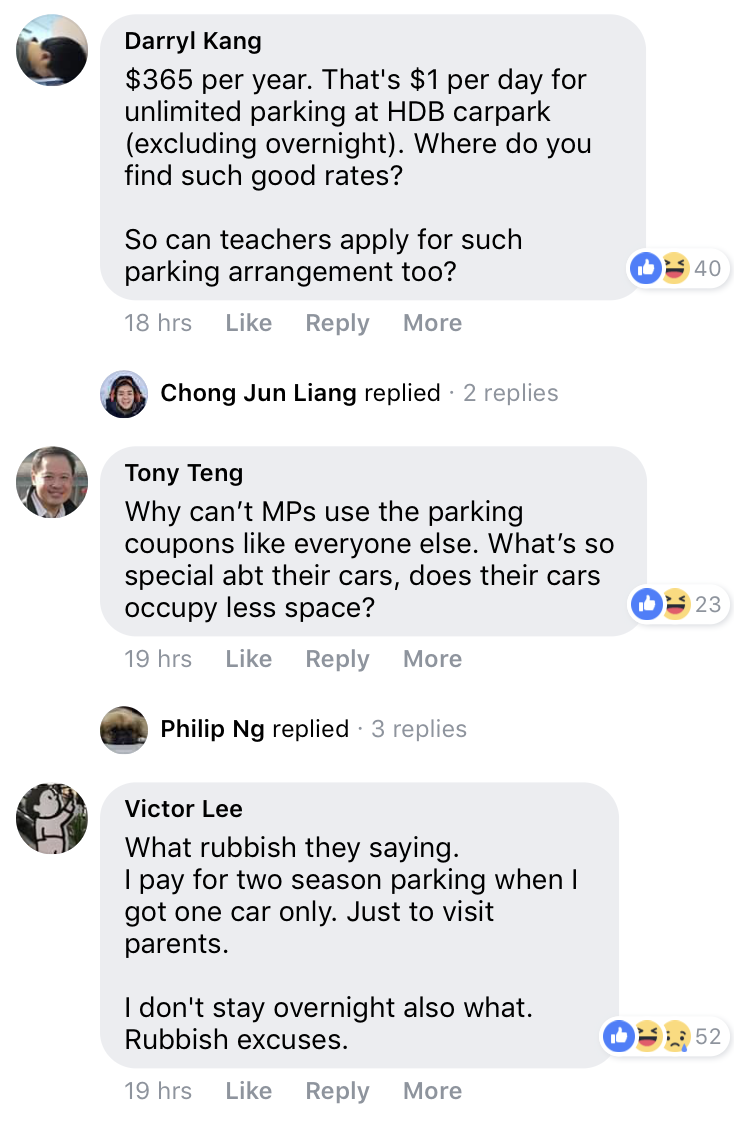 Screenshot via CNA Facebook post
Screenshot via CNA Facebook post
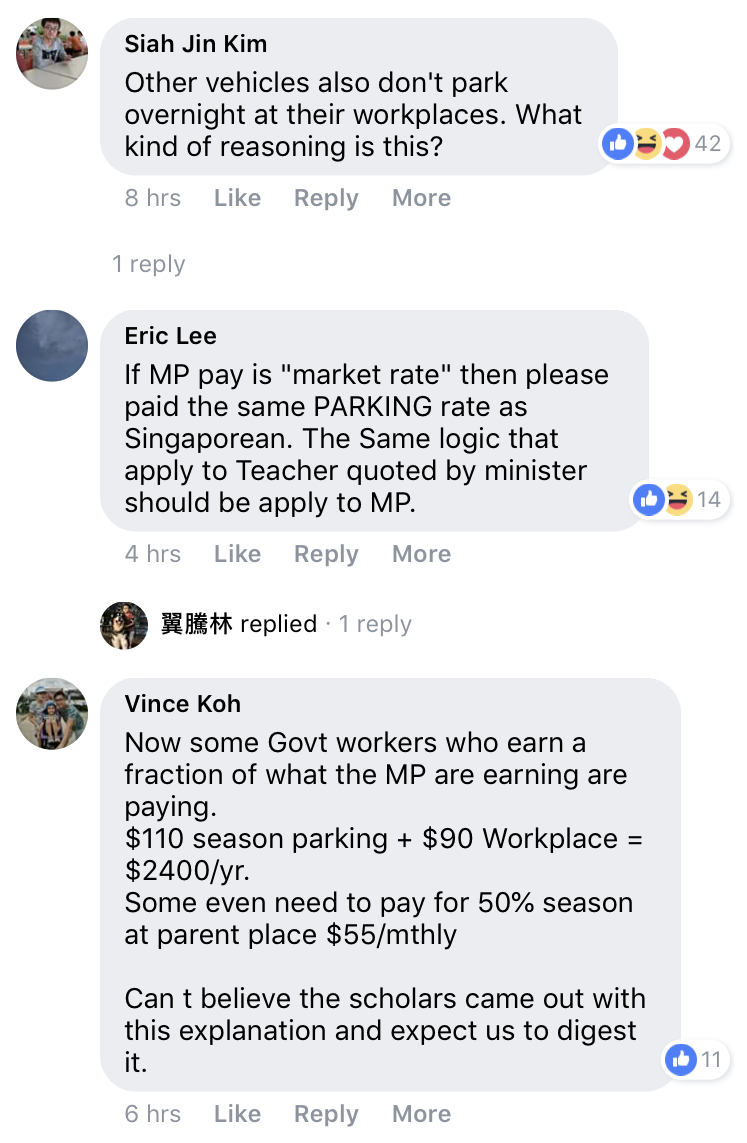 Screenshot via Straits Times Facebook post
Screenshot via Straits Times Facebook post
But one thing's definitely worth realising: we didn't come to find out this information that easily.
This came as a result of ST's continued coverage on this important issue, from as early as June 3:
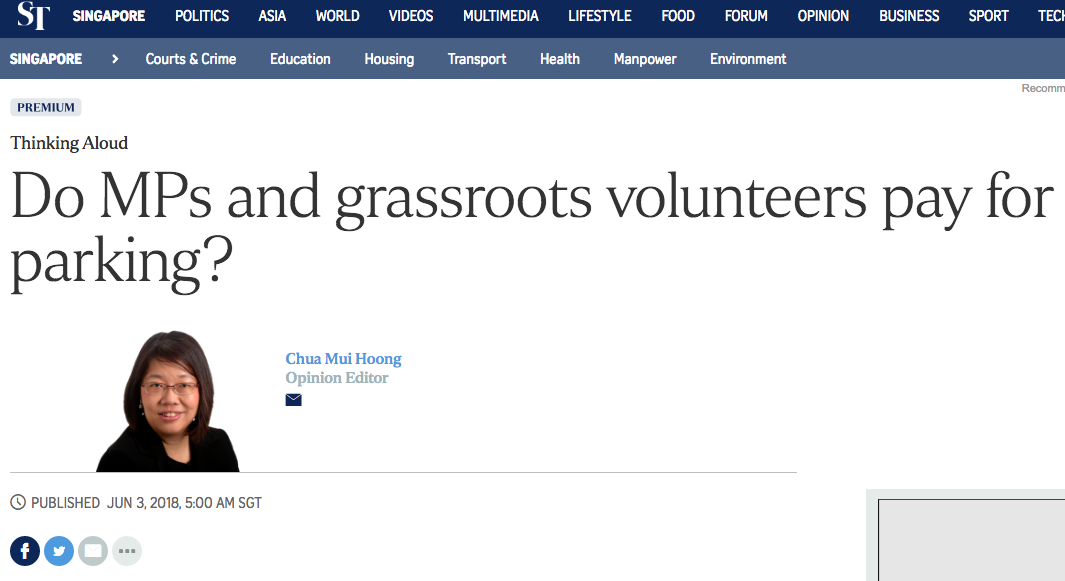 Screenshot from ST
Screenshot from ST
This premium article by Straits Times opinion editor Chua Mui Hoong was the first to mention this.
Some may have missed it — especially because it's a premium article, which understandably not everyone has access to, but Chua writes at significant length about MPs getting free parking:
Online, there was also much chatter and questions about MPs.
Is it true that they get to park for free at Parliament House?
Intrigued, I asked the Clerk of Parliament. Answer: Yes.
MPs - elected MPs as well as Non-Constituency and Nominated MPs - get to park at the restricted staff carpark at Parliament House, which is not open to the public, but only for staff, and authorised visitors and persons.
Staff pay $139.10 for a monthly season parking ticket. Like other civil servants, they pay for parking at their work premises.
In contrast, MPs park for free. The rationale is this: "Members of Parliament (MPs) do not have offices in Parliament House and do not require full-time parking here. As authorised persons to Parliament House on sitting days or when they are here for meetings to perform their official duties, MPs park their vehicles at the restricted carpark at no charge."
Can they park overnight or, say, when they are going to the theatre or a private dinner at Boat Quay nearby? The answer: No.
The official version: "They are allowed to use the restricted carpark without charges for the duration of their official business in Parliament House. Generally, no overnight parking is allowed for security reasons."
She goes on to elaborate on the case for and against free parking at Parliament House's restricted staff carpark when parliament staff have to pay full charges:
The argument for —
- As MPs are not full-time Parliament staff, the civil servant "clean wage" policy doesn't apply to them. Many have full-time jobs elsewhere.
- Are MPs paid workers or volunteers?
- Viewed as workers, Chua argues that their annual "allowance" of S$210,000 (likely more because bonuses aren't factored in) is less than what they could earn if they were not MPs. If they were seen as paid workers, they should receive more in their pay packet, and then should pay for parking like Parliament staff do.
- Chua says the allowance of free parking at Parliament house is how society "compensates" this "lower" pay they are receiving — the recognition of MPs as elected representatives who contribute socially to the country.
"In this sense, their free parking is a perk akin to that for directors of companies, or volunteers who sit on organisations' boards. They get a small allowance but not full market compensation for their time."
A short segue on "clean wage" and what that means
On the topic of "clean wage", the government's 2012 White Paper on salary revisions back then defines it as a wage "set at a competitive level with no hidden perks or privileges", and the group of people whose salaries it looked at and which this definition appears to cover includes MPs.
"This is in contrast to systems where salaries appear to be low but are in fact coupled with allowances, benefits and perks. Such systems have come under criticism in several countries because of their nontransparent nature and difficulties in control and accountability."
In the Paper's section on MPs, the following was said:
- MPs are paid an "allowance for the time and expenses incurred in serving in that capacity", and was structured on it being a "part-time" rather than a full-time role.
- MPs serve community-based and legislative roles in Parliament.
- MPs' roles are political, and so their allowances are pegged to the salaries of political office holders.
- MPs are given a monthly allowance, a 13th month bonus and the annual variable component — what was removed from the previous system is an additional GDP (gross domestic product) bonus.
- Additionally, the Prime Minister, Speaker, Deputy Speaker and political appointment holders also receive MP allowances as they have the dual roles of being MPs.
- Also, MPs elected before 1995 will receive pension up till May 20, 2011 after they step down from their MP positions.
We're not sure if this $365 parking permit is counted as a perk or added privilege, but it wasn't stated here.
And the argument against —
- The S$210,000 allowance, Chua says, is intended to compensate their constituency-work-related expenses. So it should cover parking wherever they happen to drive to as well — Parliament House included.
- Bear in mind where the carpark at Parliament House is situated — it's smack in the heart of the CBD, and the staff carpark likely has at least 100 spaces (MPs, NCMPs, NMPs and staff added up) that have to be maintained as well.
- If that's not enough, this super-prime real estate is also unused for the majority of the year, Chua adds, since Parliament only sits once a month. And not even in June or December. Gee.
"From a public accounting point of view, one can say there is wastage in keeping permanent free parking for MPs who need the space only a few days or less a month."
Interestingly, Chua concludes that "it might be more equitable to have MPs pay for hourly parking" at Parliament.
But all this was said before anyone discovered the existence of an annual parking permit for them... that comes down to S$1 per day.
Its existence emerged, though, thanks to this forum letter from Parliament Leader of the House and Minister for Culture, Community and Youth Grace Fu:
Elected MPs pay for annual parking permit
The article, "Do MPs and grassroots volunteers pay for parking?" (June 3), creates an impression that MPs get free parking at Parliament House.
Elected MPs who drive pay for an annual permit that allows them to park in Housing Board carparks, in order to do their constituency work.
This payment, which Parliament deducts from the MPs' allowances, is deemed to cover the occasions when they park at Parliament House to fulfil their duties.
Political office holders, like civil servants, also pay for parking at their ministries and agencies.
This payment generally covers the occasions when they visit other ministries and agencies on official business; and if they have to pay for public or commercial carparks in the vicinity, they are reimbursed.
Applying the same principle, teachers now pay to park at their primary places of duty.
But no one is suggesting they pay again when they visit other schools to attend meetings.
Grace Fu (Ms)
Leader of the House
But still, it was lacking — Fu only referred to parking at Parliament House, and also didn't mention how much this permit costs for driving MPs.
No — this figure, and the broad scope of the annual parking permit only emerged thanks to ST's dogged reporting.
We're not clear why there was lag time between early this month (June 3 and 4) and this week, but it's possible ST's reporters put in the request at the time, and it was only late on Monday afternoon that the information came in from the Ministry of National Development.
And that's what led to this great scoop:
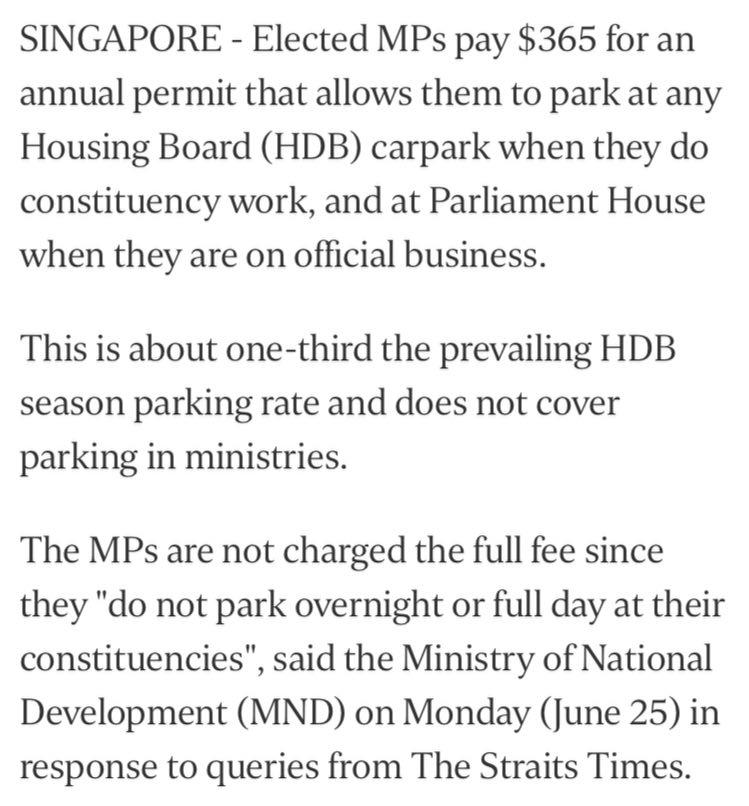 Screenshot from ST article
Screenshot from ST article
Which Channel NewsAsia went on to responsibly amplify accordingly.
And if not for the efforts of both these two to inform the public about this, none of us would have been any the wiser.
To close the loop on this matter, we will wait for Chua to provide a concluding commentary on this week's Sunday Times.
If she so chooses.
(Editor's note: A previous version of this article attributed to Chua Mui Hoong the argument that MPs are not full-time staff of the government. This is incorrect, and the sentence should read that MPs are not full-time Parliament staff. We have amended this accordingly.]
Related articles:
If you like what you read, follow us on Facebook, Instagram, Twitter and Telegram to get the latest updates.
